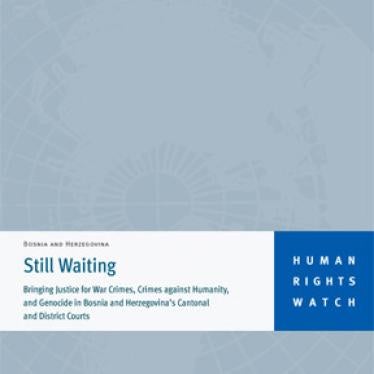It’s the day many in Bosnia believed would never come – the delivery of Radovan Karadzic to the Hague face genocide and war crimes charges. But Karadzic’s trial, a milestone for justice, will not be enough to solve Bosnia’s complex human rights problems, many linked to the bloody legacy of the war directed by Karadzic and his military partner General Ratko Mladic, who remains at large. It won’t even be enough to settle wartime accounts, especially with those who pulled the trigger, rather than those who gave the orders.
More than a decade after the war end in 1995, Bosnia’s 130,000 internally displaced persons remain vulnerable, unable or unwilling to return home, and hard-pressed to get the documents, housing and social services they need. The possible expulsion of former “mujahedin,” foreign fighters who volunteered during the war, back to their countries of origin (in North Africa and Middle East) raise concerns they face a risk of torture on return. Staying on the domestic front, war crimes prosecutions in Bosnia’s courts have a long way to go to deliver justice, though they’ve made a good start.
Bolstered by donors and international expertise, the Bosnian War Crimes Chamber in Sarajevo has fared well in prosecuting mid- and lower-level suspects referred to it by the international tribunal in the Hague and by local courts. While the chamber plays an important role in bringing justice for wartime atrocities, its work should be better known and understood among communities affected by the crimes. This means in part by better explaining how cases are selected for prosecution.
But local criminal courts continue to face challenges in their efforts to effectively tackle war crimes trials. Estimates of the number of cases vary, but could involve as many as 10,000 suspects. Courts and prosecutors’ offices in Bosnia’s municipalities (districts and cantons) need more staff and training, as well as sufficient financial support to cover the basic witness protection services and outreach programs. To address these cases, these courts need a sustained commitment from the local authorities and international donors, particularly the EU which recently signed an agreement that will pave the way for Bosnia’s eventual membership.
Those still unable to return home after the fighting in the former Yugoslavia include more than 130,000 Bosnians who are internally displaced persons and another 8,000 refugees, including Roma who fled from Kosovo. Dwindling numbers of people are returning to their pre-war homes, because they lack housing and the documents and social services they need, economic opportunities are limited, and they fear continued violence. Government-funded housing schemes, aimed at re-invigorating returns, are few and far between.
The controversy over foreign fighters in Bosnia has been exacerbated by fears of Islamic terrorism in Europe post-9/11. Under the Dayton peace accord that ended the war, foreign fighters (most from North African and Arab countries) should have left Bosnia after the war, but some stayed behind, marrying Bosnian women, establishing families and gaining Bosnian citizenship. Since 2007 a government commission has reviewed these naturalizations, and is said to be motivated solely by concerns over irregularities in the naturalization process. But it also appears to be moved by fears about the presence in Bosnia of alleged Islamist radicals with links to terrorism.
Only one Bosnian fighter, of Algerian origin, has been expelled thus far, but another 300 have had their status rejected by the commission. Some have appealed the commission’s decisions and remain in Bosnia pending resolution of those appeals, while others have left the country. Human rights organizations have major concerns about the lack of adequate safeguards against serious abuses, in both the lack of a fair hearing on the removal of citizenship and in the subsequent deportations. Former fighters whose Bosnian citizenship is revoked are being threatened with deportation to countries such as Algeria, Syria and others with poor records on torture, particularly for those labelled terrorism suspects.
Karadzic’s trial in The Hague is a chance for Bosnia to come to terms with the past. But the Bosnian authorities, with the EU’s guidance and support, need to do much more at home to safeguard the basic human rights of all, including war victims seeking justice, the displaced and foreign fighters. A Bosnia that’s fair and inclusive would be a great victory for its people – and a grave defeat for Karadzic.







